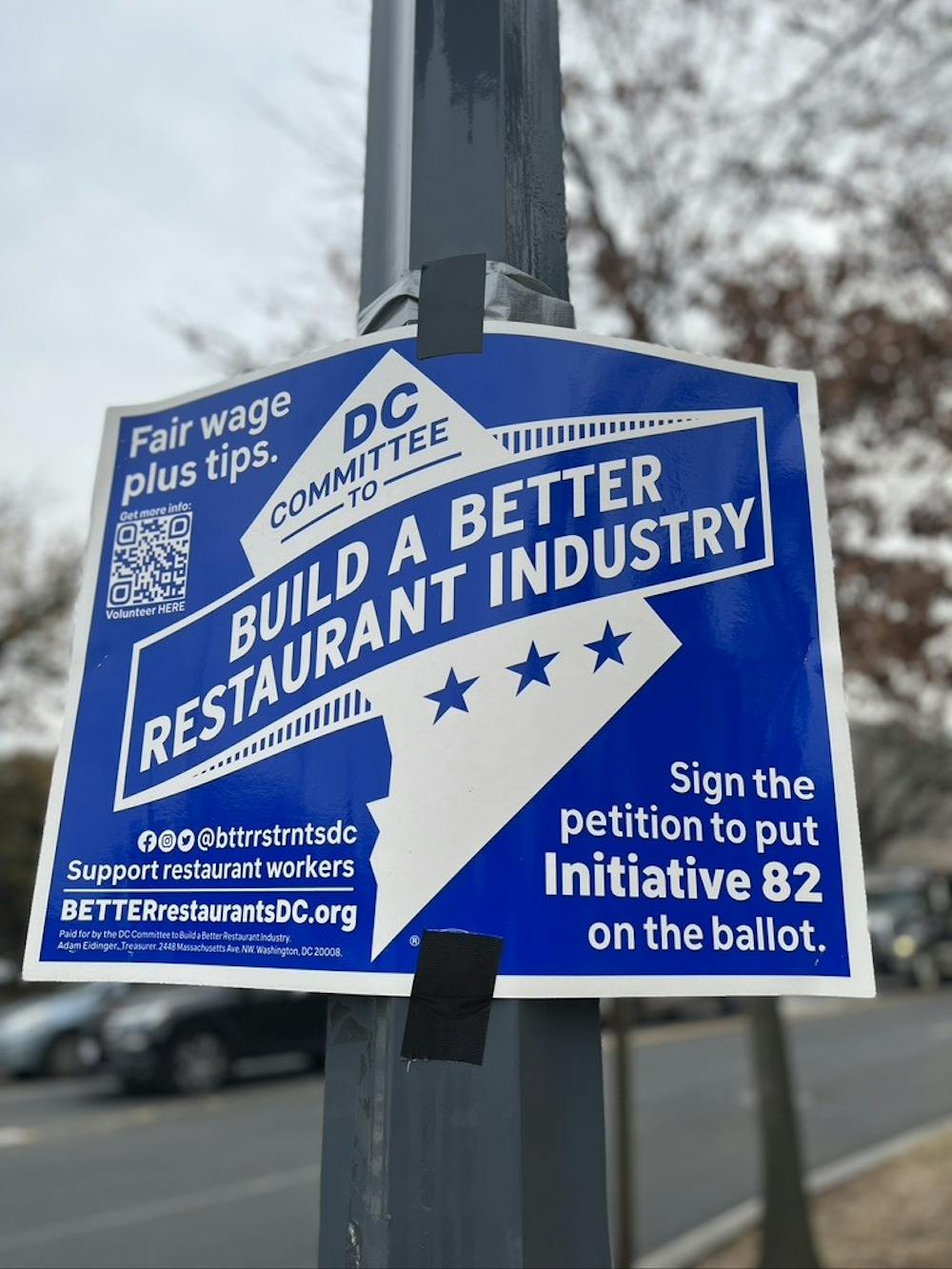An initiative, known as Initiative 82, to raise the minimum wage for tipped workers has secured over 26,000 signatures, enough to appear on the D.C. primary election ballot in June.
The petition would raise pay for tipped workers from $5.02 per hour plus tips to D.C.’s full minimum wage of $15.20 per hour plus tips. Petition collectors had until Feb. 22 to gather signatures from at least 5 percent of the district’s active voter population to qualify for the June election.
Ryan O’Leary, who graduated from American University in 2013, has spent more than a decade working in political organizing and waiting tables in D.C. He said he has seen harassment and discrimination in the restaurant industry go unreported by workers, out of fear that customers will tip poorly. In response, O’Leary filed the proposal with the Board of Elections on June 21, 2021, and has since received enough signatures to appear on the ballot.
Director of the Kalmanovitz Initiative for Labor and the Working Poor Joseph McCartin said an industry that relies so heavily on tips encourages an imbalance of power.
“You’re at the mercy of your customer,” McCartin said. “You’re not a worker or waiting on them, but rather you’re a servant and if you want to be properly compensated you have to, in some cases, be a little more servile.”
O’Leary, who helped collect signatures, hopes that increasing the hourly wage will empower tipped workers.
“If you experience harassment, discrimination or just rudeness, you can call it out and not have to worry that the bulk of your wage is going to be affected,” O’Leary said.
Despite pandemic obstacles limiting direct contact with voters, organizers were able to surpass the minimum requirement of 26,000 signers before the deadline by frequenting outdoor events like holiday markets and sports games. O’Leary said the campaign leveraged the citywide coronavirus response to engage voters at rapid test distribution sites.
“It was just a line of D.C. voters, hundreds at a time, every day,” O’Leary said. “We were able to go down those lines of people and we got a lot of signatures that way.”
Initiative 82 is not the first of its kind. In 2018, voters approved an increase in wages for tipped workers. According to the D.C. Board of Elections results archive, seven of the city’s eight wards voted in favor of the increase. The earlier initiative was overturned by the D.C. City Council after restaurants launched an opposition campaign, arguing that customers would not continue to tip if servers made minimum wage.
O’Leary called the campaign, led by regional trade organization Restaurant Association of Metropolitan Washington, astroturfing. Astroturfing is used to describe an organized public campaign that is falsely portrayed as a grassroots movement. However, O’Leary is confident that differences in the current climate will contribute to the success of the initiative.
The Restaurant Association of Metropolitan Washington declined The Eagle’s request to comment on Initiative 82.
He thinks it unlikely that the restaurant industry will push back this time around because they are struggling to rehire workers who are calling for better conditions and compensation.
McCartin said he also thinks the political terrain has changed significantly in the past four years and noted that the restaurant industry’s public opposition campaign has largely disappeared.
“I think they realize now that they just can’t be seen publicly taking that stand anymore,” McCartin said. “Because they’re going to be basically sending the message to workers that this is not a good industry to work in.”
Anthony Gualtieri, a public anthropologist and adjunct professor in the College of Arts and Sciences at AU, said he thinks the careful drafting of the initiative's text makes it highly unlikely that lawmakers will not adopt it as is.
“Having looked at the actual text of the legislation and read it, there is nothing really in there that I would see them having to do a lot of work crafting or changing,” Gualtieri said.
Gualtieri said changes to the D.C. City Council have increased the likelihood that the initiative will be adopted.
“Members who were against it and voted to veto it are no longer on the council,” Gualtieri said. “They’ve been replaced by people who are much more friendly to labor and to issues related to inequality.”
Former council members David Grosso, Jack Evans and Brandon T. Todd voted in favor of repealing the initiative in 2018.
O’Leary said he is hopeful that increased advocacy from D.C. City Councilmembers like Janeese Lewis George and Christina Henderson, who were not yet elected in 2018, will have an impact.
“COVID changed people’s minds,” O’Leary said. “The restaurant industry is in a different state than it was before, the council is different than it was before and I think all those things coming together mean that this time it's actually going to happen.”
Correction: A previous version of this article incorrectly named Councilmember Janeese Lewis George.





